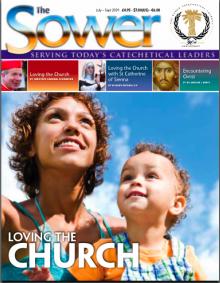Church teaching helps us to see how to personally appropriate the Scriptures as living sources for our lives and for our catechesis.
John Paul II’s apostolic exhortation Catechesi Tradendae (CT) begins by underscoring the christocentricity of catechesis. Since a Person, the Person of the Lord, is at the heart of catechesis, then the “primary and essential object of catechesis is… ‘the mystery of Christ.’” Moreover, this means that “the aim of catechesis is to put people not only in touch but in communion, in intimacy, with Jesus Christ: only he can lead us to the love of the Father in the Spirit and make us share in the life of the Holy Trinity” (CT §5).
A deeper understanding of the mystery of Christ is tied significantly to the Word of God, as it is articulated in Scripture and Tradition. The catechumen and catechesis itself are to be “impregnated” with the word of Scripture (CT §§20, 27).[i] The Catechism of the Catholic Church (CCC) reinforces and deepens these points by teaching that “Christ … is the Father’s one, perfect, and unsurpassable Word…[in whom] he has said everything” (CCC §65) and that “through all the words of Sacred Scripture, God speaks only one single Word, his one Utterance in whom he expresses himself completely” (CCC §102).[ii]
Given the correlation between the living Word of God, Christ, and the Scriptures, it is not uncommon for catechumens and catechists to tell of reading or hearing Scripture in a way that speaks directly to their hearts and the circumstances of their lives. Those who have received this grace testify to the intense sense of meaning that is found in the personal appropriation of Scripture that now fills, spiritually feeds, and directs their lives. The Scriptures are for them no “dead letter” (CCC §111; cf. 2 Cor 3:6) but the living word of God (Hebrews 4:12).
As wonderful as this experience is, it raises two questions. First, how may we explain theologically the experience of personal appropriation of Scripture for one’s life? Second, how is such an interpretation of Scripture deeply personal and yet not private so as not to succumb to the literalism of biblical fundamentalism?
The rest of this online article is available for current Guild members.
This article is from The Sower and may be copied for catechetical purposes only. It may not be reprinted in another published work without the permission of Maryvale Institute. Contact [email protected]

















